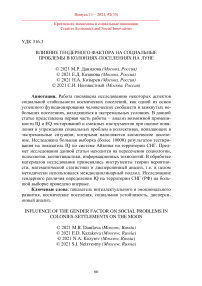Влияние гендерного фактора на социальные проблемы в колониях-поселениях на Луне
Автор: Данилова М.Р., Казакова Е.Д., Козырев Н.А., Неизвестный С.И.
Журнал: Креативная экономика и социальные инновации @cesi-journal
Статья в выпуске: 2 (35) т.11, 2021 года.
Бесплатный доступ
Работа посвящена исследованию некоторых аспектов социальной стабильности космических поселений, как одной из основ успешного функционирования человеческих сообществ в замкнутых небольших поселениях, находящихся в экстремальных условиях. В данной статье представлена первая часть работы - анализ возможной применимости IQ и EQ тестирований и смежных инструментов при оценке появления и упреждения социальных проблем в коллективах, попадающих в экстремальные ситуации, которыми наполняется космическое поселение. Исследована большая выборка (более 10000) результатов тестирования на показатель IQ по системе Айзенка на территории СНГ. Предмет исследования данной статьи находится на пересечении социологии, психологии, когнитивистики, информационных технологий. В обработке материалов исследования применялись инструменты теории вероятности, математической статистики и дисперсионный анализ, т.е. в целом методически использовался междисциплинарный подход. Исследование гендерного различия определения IQ на территории СНГ (РФ) на большой выборке проведено впервые.
Показатель интеллектуального и эмоционального развития, космические поселения, социальная устойчивость, дисперсионный анализ
Короткий адрес: https://sciup.org/142231818
IDR: 142231818 | УДК: 316.3
Текст научной статьи Влияние гендерного фактора на социальные проблемы в колониях-поселениях на Луне
Решению технических проблем космических поселений в последнее время уделяется большое внимание. Однако успешная жизнедеятельность поселения зависит не только от решения этих проблем. Авторы данной работы попытались исследовать некоторые аспекты социальной стабильности космических поселений, как одной из основ успешного функционирования человеческих сообществ в замкнутых небольших коллективах, находящихся в экстремальных условиях. В данной части работы авторы изучают возможные фундаментальные гендерные отличия, которые могут повлиять на социальную стабильность космического поселения. С этой целью в статье исследуется гендерное различие в таких показателях как коэффициент интеллектуального, эмоционального (и социального) развития. В следующей статье будут рассмотрены вопросы возможных социальных проблем и фобий в колониях-поселениях на Луне.
Исследование гендерного различия в тестах определения IQ на территории СНГ (РФ) на большой выборке проведено впервые.
Зависит ли социальная устойчивость и внутренняя безопасность коллектива, команды людей от гендерных факторов? Как влияют IQ и EQ членов команды на эту устойчивость и безопасность при работе в экстремальных условиях, например, в космических поселениях? Какова
Креативная экономика и социальные инновации Creative Economics and Social Innovations роль в стабилизации коллектива персонального рационального и эмоционального? Эти актуальные вопросы рассматриваются в этой и следующей статье.
Очевидно, что показатель интеллектуального развития может играть одну из важнейших ролей в отборе кандидатов в космические поселения, высвечивая состояние контекстуальной (знания и навыки работы с объектами исследования) и технической (работа с процессами исследования) компетентностями. Тестирование IQ рассчитано на рациональное восприятие, обращены к логическому мышлению и не предполагает никакого особенного выхода за пределы самотождественности. Хотя некоторые варианты IQ тестирования содержат оценку психометрических параметров, в целом рациональное не опережает более глубокого и целостного восприятия ситуаций, чтобы прежде, чем научиться их понимать, мы научились их не понимать, представлять границы своей ограниченности. Последнее очень важно при попадании человека в нестандартные ситуации в экстремальных условиях, которые существуют в космических поселениях.
Показатель эмоционального (и социального) интеллекта является одним из основных индикаторов поведенческой компетентности и природной врожденной предрасположенности человека к тому или иному виду деятельности. Некоторые аспекты EQ тестирования, апеллируя к чувствам, настолько контринтеллектуальны, что никак не могут быть подменены элементами типового IQ тестирования. Обращенное к рациональному сознанию включает анализ причинно-следственных связей, то есть само содержит эти связи на уровне моделирования истории, сюжета тех или иных ситуаций во время подготовки к космической миссии. В экстремальных ситуациях, требующих мгновенной реакции, человек как правило принимает решение инстинктивно, на уровне врожденных, генетически передаваемых действий. При этом времени на подключение логики, рассуждений может не хватать: подключаются способности понимания через эмпатию, способности сопереживать, узнавать и подхватывать в эмоциях, невербально транслируемых окружающим сообществом и самим собой. Однако важно, чтобы человек, попадающий в экстремальные ситуации не «растворился» в эмоциях, сохранял при этом ясность мышления, трезвый ум, а также смог управлять и своими эмоциями, и эмоциями людей, находящихся в непосредственной близости и контакте для преодоления трудностей и выполнения поставленных задач. Т.е., в реальной жизни в подобных ситуациях важен компромисс способностей человека, оцененных по тестам IQ и EQ.
Креативная экономика и социальные инновации Creative Economics and Social Innovations
IQ коррелирует с уровнем развития абстрактного мышления, со способностью человека учиться. Тестирование на IQ не признано отделять «умных» от «глупых», как это принято считать в широких кругах общества. Как показывают специалисты в области когнитивистики, умственные способности во многом определяются генетической наследственностью, а также культурным окружением, обучением и опытом [15]. Что же касается социального успеха, то он в большей степени коррелирует с EQ и в меньшей с IQ [6]. Уровень IQ коррелирует с уровнем ВВП страны [7], но эта корреляция для исследований в данной работе не принципиальна, поскольку лежит вне их тематики (нас интересуют проблемы социальной стабильности команды космического поселения, сформированной из представителей технологически развитого государ-ства/государств).
Цифровая трансформация в обществе, в особенности активизированная в эпоху пандемии и постпандемии, выявила тенденцию к быстрому внедрению цифровых инструментов, роботизации и резкого развития используемых ИИ. Человек начал активно замещаться роботами и ИИ. Специалисты прогнозируют, что в недалеком будущем человек начнет уступать роботам по показателю IQ [8]. Во многом эта тенденция очевидна в области использования энциклопедических знаний, big data, скорости вычислений и даже скорости принятия решений. И если человек проиграет роботам в уровне IQ. то в уровне EQ, по-видимому в обозримом будущем робот не сможет превзойти человека.
Если интеллектуальное развитие человека по IQ может быть заменено в его цифровом двойнике роботом, то что касается эмоционального интеллекта EQ, робот в обозримом будущем не сможет заменить человека [8]. Искусственный интеллект пока не в состоянии освоить компетенцию эмпатии, сострадания, рефлексии, медиации и другие компетенции, свойственные сугубо человеку.
Способность человека к эффективной бесконфликтной коммуникации в обществе иногда характеризуют показателем социального интеллекта, который тесно связан с эмоциональным интеллектом и его можно рассматривать как составную часть EQ [9, 10]. Поэтому в данной работе мы не будем выделять и отдельно рассматривать социальный интеллект в исследуемой проблеме.
Наша работа не затрагивает проблемы разработки систем тестирования с хорошими психометрическими метриками для отбора кандидатов в самодостаточные высокоустойчивые команды, работающие в экстремальных условиях. Мы лишь пытаемся проанализировать возможную
Креативная экономика и социальные инновации Creative Economics and Social Innovations применимость IQ и EQ тестирований и смежных инструментов при оценке появления и упреждения социальных проблем в коллективах, попадающих в экстремальные ситуации, которыми наполняется космическое поселение.
Поскольку при отборе кандидатов в космические поселения предпочтения отдаются людям наиболее работоспособного возраста: 25-45 лет, мы в своих исследованиях обращали внимание именно на эту возрастную категорию.
Литературный обзор
Специалистами разработано много тестов на определение коэффициента IQ. Тесты как правило разрабатываются для определенной возрастной группы испытуемых. Некоторые тесты в качестве заданий используют лишь графические изображения, рисунки – этот так называемые невербальные тесты. Вербальные тесты используют задания в виде текстов и слов – результаты этих тестов в значительной степени зависят от владения испытуемыми данным языком.
Одним из самых распространенных и эффективных тестов для взрослого населения (старше 18 лет) считается тест Ганса Айзенка [11]. В данной работе мы использовали этот тест, который относится к комбинированным «вербально-невербальным». Что касается единого стандарта на тестирование IQ, то его до сих пор нет.
К настоящему времени в открытом доступе находится много результатов исследований IQ на предмет гендерных различий. Часть этих исследований склонна утверждать, что у мужчин IQ несколько выше, чем у женщин [12-13], особенно серьезные выводы в этом направлении были сделаны П. Ирвином и Р. Линном [14], собравших, пожалуй, самый обширный материал по определению IQ к 2005 г. Однако С. Блинк-хорн показал в своей работе [15], что методически результаты П. Ирвина и Р. Линна получены не вполне корректно и не свидетельствуют о гендерном различии тестирования IQ. Другая часть исследований показывает неопределенные результаты, так, например, в работе [16] отмечается, что разброс IQ внутри выборок мужчин и женщин выше, чем отличия средних значений между этими выборками. Эти заключения делались по сравнительно небольшим выборкам объемом от 100 до 1000. В работе [17] показано, что в среднем IQ мужчин на 4.6 балла выше, чем у женщин. И в той же работе определено по выборке в Бельгии, что IQ женщин выше, чем у мужчин. Объемы анализируемых выборок этой работы составляют в основном порядка сотни, хотя указывается единственная большая выборка (студенты Мексики) объемом около девяти
Креативная экономика и социальные инновации Creative Economics and Social Innovations тысяч, в которой исследования статистически проведены некачественно и в окончательных расчетах эта выборка исключалась. В целом авторы работы говорят о неустойчивости полученных результатов, требующих дальнейших более убедительных исследований.
Другая часть исследователей в принципе не находит гендерных отличий в определении IQ [18-23]. К сожалению, информации о качественных исследованиях гендерных различий в определении IQ по репрезентативным выборкам на территории СНГ в открытой печати нет.
Что касается возраста исследуемых групп, то подавляющее большинство работ посвящено исследованию школьников и подростков до 18 лет. Интересующую нас возрастную категорию (30 лет) населения СНГ с точки зрения статистически значимых результатов практически никто не исследовал.
Таким образом результаты исследований, опубликованные в открытой печати, в целом носят неопределенный и статистически неубедительный характер относительно гендерных различий в значении тестов IQ.
Эмоциональный интеллект (EQ) непосредственно влияет на социально-психологическую устойчивость коллектива [24-29]. И IQ, и EQ показывают взаимосвязь со здоровьем человека [30]. EQ частично можно отнести к показателям культуры социального общения [31].
EQ возник как важнейший психологический конструкт в начале 1990-х годов, где он был концептуализирован как набор способностей, во многом аналогичных общему интеллекту. Одна из фундаментальных работ по EQ была проведена Salovey P. и Mayer J. D. в 1990 г. [32], которые определили EQ как “способность контролировать свои собственные и чужие чувства и эмоции, различать их и использовать эту информацию для руководства своими мыслями и действиями”. Они утверждали, что люди с высоким уровнем EQ обладают определенными эмоциональными способностями и навыками, связанными с оценкой и регулированием эмоций в себе и других. Соответственно, утверждалось, что люди с высоким уровнем EQ могут точно воспринимать определенные эмоции в себе и других (например, гнев, печаль), а также регулировать эмоции в себе и других для достижения ряда адаптивных результатов или эмоциональных состояний (например, мотивация, творческое мышление). Проанализировав существующие модели и представления об эмоциональном интеллекте один из ведущих российских специалистов в области изучения EQ, Д. Люсин, дает краткое определение EQ как «способности к пониманию своих и чужих эмоций и управлению ими» [33]. Д.
Креативная экономика и социальные инновации Creative Economics and Social Innovations
Люсин делит эмоциональный интеллект на «внутриличностный» (ВЭИ), направленный на собственные эмоции человека и «межличностный» (МЭИ), на правленный на эмоции других. Интересный результат исследований приводят авторы одной из недавних работ [34], который свидетельствует о принципиальном различии уровня ВЭИ и МЭИ у мужчин и женщин (рисунок 1). С точки зрения формирования команды космического поселения этот результат может являться значимым аргументом в пользу того, что мужчины и женщины «дополняя» друг друга создают эмоционально устойчивой баланс внутри коллектива.
Авторы работы [34] приходят к следующему обобщенному заключению: – «Уровень развития эмоционального интеллекта, несомненно, оказывает влияние на общение людей между собой (на качество этого общения и его эффективность). Но на данный момент не существует единой точки зрения у учёных относительно определения понятия эмоционального интеллекта». Тем не менее, современными исследователями считается общепринятым тот факт, что EQ может использоваться как показатель способности управления эмоциями человека, в целом характеризующий уровень эмоциональной зрелости.
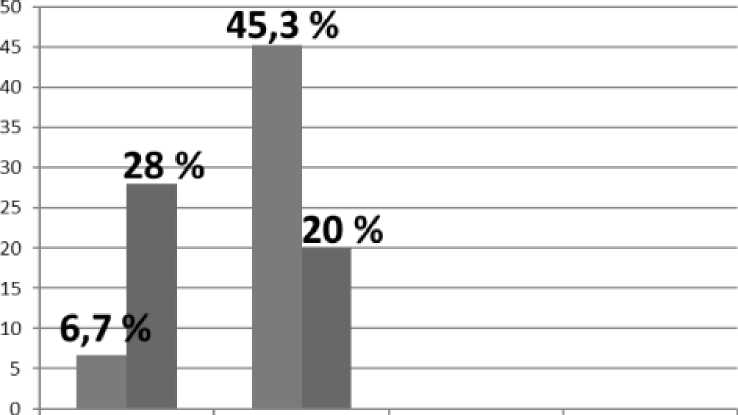
■ Девушки
■ Юноши
Внутри личностный Межличностный эмоциональный эмоциональный интеллект интеллект
Рисунок 1. Соотношение эмоционального интеллекта мужчин и женщин
Креативная экономика и социальные инновации Creative Economics and Social Innovations
Нет статистически значимого различия оценки EQ мужчин и женщин по выборке 700 студентов по исследованиям в работе 2018 г. [35]. В работе подчеркивается некоторая связь отдельных составляющих EQ с особенностями взаимодействия в коллективе, которая, по-видимому, отражает наличие естественных причинно-следственных связей сигнала «источника» и реакции «приемника». В недавней работе российских исследований [36] у женщин как правило более высокий уровень эмоционального интеллекта наблюдался в области управления эмоциями и в области управления изменениями эмоций. У мужчин более высокий уровень эмоционального интеллекта наблюдался только в области динамики EQ в части понимания и анализа эмоций.
Пожалуй, одна из самых фундаментальных работ по гендерному различию EQ [37] использовала комбинацию вербального и невербального тестирования. По выборке около 5000 человек в этой работе были определены статистически не значимые различия EQ мужчин и женщин. В этом исследовании оказалось, что мужчины, более сильно воспринимают присутствие нецелевых эмоций, чем женщины. Кроме того, авторы обнаружили, что более низкие баллы мужчин в самооценке EQ не были связаны с их фактическим восприятием целевых эмоций, но это было связано с восприятием нецелевых эмоций. Проверка предположения эмоциональной чувствительности показала, что женщины более чувствительны к восприятию тонких, то есть низкоинтенсивных или неоднозначных, эмоциональных сигналов. Таким образом, гипотеза эмоциональной чувствительности не была подтверждена. Это относится к восприятию как целевых, так и нецелевых эмоций.
Относительно реакции на невербальные эмоции есть основания сомневаться в том, что существуют устойчивые гендерные различия в восприятии конкретных эмоций, присутствующих на лице [38]. У мужчин меньше уверенности в собственном эмоциональном интеллекте, в том числе в способности воспринимать эмоции на лице, чем у женщин. Однако этот более низкий показатель не предсказывает их восприятие целевых эмоций, но он связан с их более сильным восприятием следов эмоций, которые не были запланированы или даже не присутствовали. Следует иметь в виду, что обнаруженные в работе [37] различия были незначительными, и поэтому пока нельзя утверждать о научной значимости этих исследований: необходимы дополнительные исследования того, как именно мужчины и женщины различаются в восприятии тонких эмоциональных сигналов.
Креативная экономика и социальные инновации
Creative Economics and Social Innovations
Материалы и методы
В данной работе применялся междисциплинарный подход, методы таксономии и онтологий (исследование причинно-следственных связей), методы статистического анализа выборок, дисперсионный анализ. Мы использовали комбинированный тест Айзенка [11], в качестве исходных данных брались результаты тестирования, опубликованные в источнике [38].
При формировании входных данных проводилась чистка исходных данных на предмет неточных и балластных оценок IQ:
-
- убиралось дублированное прохождение теста, неопределенности гендерной принадлежности, общие сомнительные случаи, сопровождаемые неадекватными комментариями авторов прохождения тестирования;
-
- анализировались исходные данные на предмет явных (неправдоподобных) выбросов (например, значения IQ равные «0»).
Кроме формирования устойчивых входных выборок в данной работе решались две статистические задачи:
-
- определение статистического среднего выборок;
-
- проверка статистических гипотез.
Для обработки данных в рамках наших задач было достаточно статистических возможностей последней версии Excel из пакета MS Office.
Результаты и обсуждение
Анализ форм распределений выборок (см. рисунки 2-4) показывает, что все они не являются нормальными. Это повлияло на выбор статистических методов анализа, которые работают с не Гауссовыми распределениями.
В данной работе использовался критерий Стьюдента в двух назначениях.
Для начала рассматривалась гипотеза : среднее значение по выборкам «Мужчины» и «Женщины» равно математическому ожиданию в этих выборках. Упомянем, что математическое ожидание более точно характеризует дискретную выборку, а наша выборка именно дискретная и ограниченная. Данные действия необходимо выполнить для того, чтобы ответить на вопрос: можно ли далее использовать критерий Стьюдента для сравнения средних значений по выборкам мужчин и женщин; другими словами – проверке следующей гипотезы : среднее значение по выборкам «Мужчины» и «Женщины» совпадают.
Креативная экономика и социальные инновации Creative Economics and Social Innovations
Объем общей выборки (сумма выборок «Женщины» и «Мужчины») составлял 10323 результата определения IQ, выборка «Женщины» составлял 3505 и выборка «Мужчины» 6818 соответственно. Объем выборки «Женщин» существенно меньше объема выборки «Мужчин», что можно интерпретировать как более низкий интерес женщин к самооценке IQ, мужчины проявляют свой «соревновательный дух» более активно интересуются своим IQ. В принципе можно предположить, что если «гипотетически» нивелировать добровольный характер прохождения тестирования, то это могло бы повлиять на результаты гендерного различия в определении IQ. Однако будем считать это «тонкостями» второго порядка, мало влияющими на результаты данной работы.
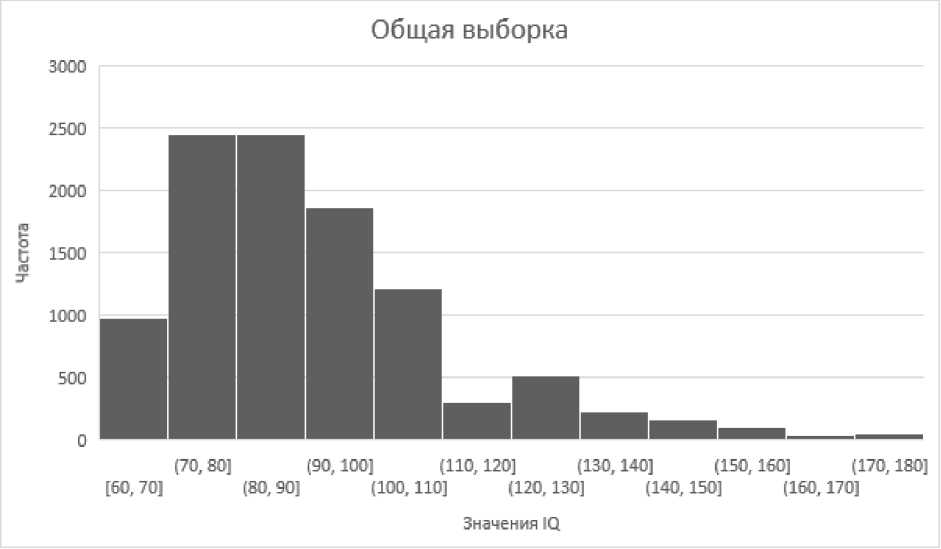
Рисунок 2. Гистограмма распределения общей выборки оценок IQ
На рисунках 2-4 представлены гистограммы выборок. Внешний вид всех трех выборок показывает существенное отличие от нормального распределения (распределения Гаусса), наблюдается значительная асимметрия, резкий завал левого крыла и сильная удалённость правого. Для количественного подтверждения этих качественных характеристик мы провели оценку эксцессов распределений, результаты которых представлены в таблице 1. Все значения эксцессов больше ноля и положительны – это означает, что распределения отличаются от нормального
Креативная экономика и социальные инновации Creative Economics and Social Innovations существенной правосторонней асимметрией и повышенной остротой ее вершины. Остроконечность выборки «Женщины» (эксцесс равен 2.18) выражена значительно сильнее других выборок, т.е. мода выборки нагляднее представлена.
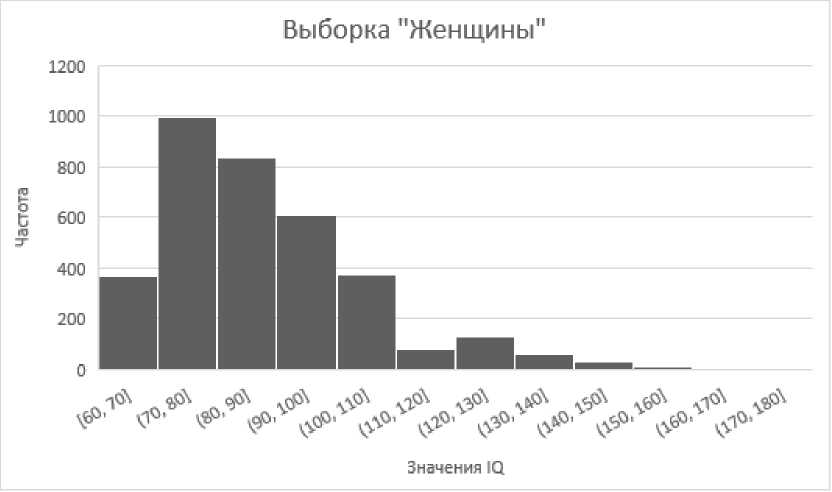
Рисунок 3. Гистограмма распределения выборки оценок IQ «Женщины»
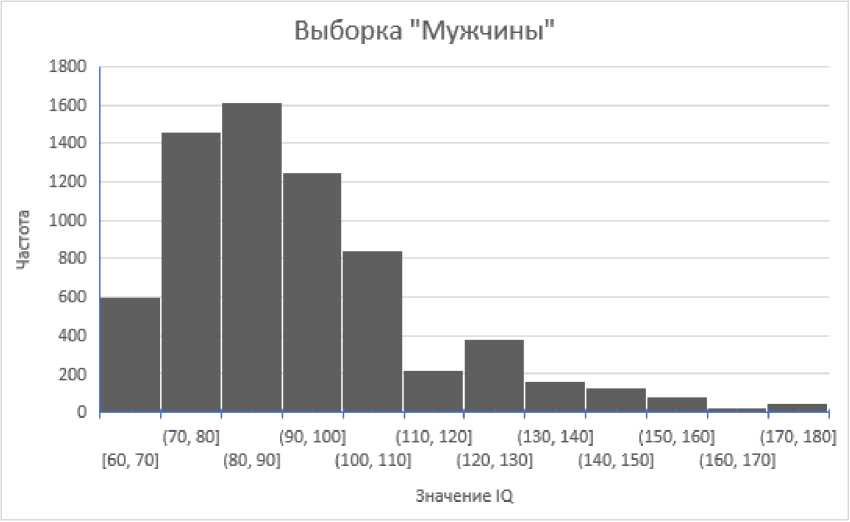
Рисунок 4. Гистограмма распределения выборки оценок IQ «Мужчины»
Креативная экономика и социальные инновации Creative Economics and Social Innovations
Двусторонний критерий Стьюдента при проверке гипотезы «среднее значение по выборке равно мат. ожиданию выборки» не отвергает гипотезу на уровне значимости 0.01 как для выборки «Мужчины», так и для выборки «Женщины». Таким образом, несмотря на отличие распределений от нормального вида, мы можем использовать критерий Стьюдента для сравнения средних значений данных выборок.
Оценка среднего по выборке «Мужчины» на объеме, равном объеме выборки «Женщины» (3505) практически совпадает с оценкой среднего для всего объема выборки «Мужчины» (6818), с той лишь разницей, что ошибка оценка среднего во втором случае примерно на 40% более точная. В наших исследованиях среднее значение выборки «Мужчины» на 4.93 единицы выше, чем у выборки «Женщины» (см. таблицу 1). Применение двустороннего критерия Стьюдента показало, что гипотеза о совпадении средних значений двух выборок отвергается на уровне значимости более 0,001.
Таблица 1. Параметры выборок
|
Выборка |
Объем |
Среднее |
Сигма |
Ошибка среднего |
Дисперсия |
Эксцесс |
|
Общая |
10323 |
94.30 |
20.80 |
0.20 |
432.69 |
1.95 |
|
Женщины |
3505 |
91.04 |
18.22 |
1.54 |
332.10 |
2.18 |
|
Мужчины |
6818 |
95.97 |
21.83 |
1.16 |
476.25 |
1.66 |
Очевидно, что числовое значение выборочной оценки принимается за наилучшее приближение к истинному параметру генеральной совокупности, то есть неизвестный параметр генеральной совокупности оценивается одним числом (точкой), определенным по выборке. При таком подходе всегда существует риск совершить ошибку, поэтому точечная оценка должна дополняться показателем возможной ошибки при определенном уровне вероятности.
При сравнении дисперсий выборок «Женщины» и «Мужчины» формулировалась нулевая гипотеза : дисперсии выборок одинаковы. Для проверки этой гипотезы использовалась двусторонняя функция Фишера [39], определяющая вероятность равенства дисперсий выборок. Согласно критерию Фишера, вероятность равенства дисперсий для наших выборок приближается к 0,00 на уровне значимости 0,001, т.е. нулевая гипотеза о том, что дисперсии исследуемых выборок совпадают – отвергается.
Креативная экономика и социальные инновации Creative Economics and Social Innovations
Дисперсия распределения выборки «Мужчины» почти в полтора раза больше, чем дисперсия выборки «Женщины». Причем это же соотношение дисперсий сохраняется и в варианте приведенных к одинаковому объему выборок (3505).
Некоторые статистические выводы из дисперсионного анализа данных исследований можно сделать следующие:
– женщины по интеллекту (если точнее: анализируемая выборка IQ женщин) более однородны;
– мужчины по интеллекту имеют более широкий разброс, выборка по IQ мужчин неоднородна.
Некоторые социальные (антропометрические) выводы:
– мужчины более разнородны, «экспрессивны» («революционны»), вносят дестабилизацию в развитие общества.
С определенной степенью условности принимаем средний возраст прошедших тест IQ Айзенка примерно равным среднему возрасту пользователей интернета (30 лет с небольшим гендерным дисбалансом в пользу мужчин [40]).
Выводы
EQ и IQ – это очень важные показатели, которые позволяют человеку совершить то или иное действие в соответствии с ситуацией, в которой он оказался, и найти оптимальный выход. По тестам, которые нацелены на выявлении критериев успешности руководителя, EQ отвечает за 80% успехов, а IQ - лишь за 20%.
Таким образом, показатели эмоционального интеллекта очень важны, как и показатели интеллекта. Более того, баланс между IQ и EQ необходим. При этом «мозг мышления» способен корректировать функционирование «мозга чувств» с помощью эмоционального саморегулирования, не давая эмоциям заполучить тотальный контроль.
Дисперсионный анализ, использованный в данных исследованиях, показал превышение дисперсии выборки тестов IQ у мужчин в полтора раза больше, чем у женщин. Как отмечает выдающийся биофизик Симон Шноль «неуничтожимый разброс результатов измерений процессов любой природы» имеет фундаментальные причины [41]. Этот разброс не следует игнорировать и продолжить усилия по поиску причинноследственных связей, вызывающих очевидный дискрепанс дисперсий исследуемых выборок.
Относительно эмоционального интеллекта большинство исследований показывают статистически незначимые отличия мужчин и женщин.
Креативная экономика и социальные инновации Creative Economics and Social Innovations
Хотя, например, биологическое (невербальные эмоции) объяснение предполагает, что женская биохимия является лучше приспособленной к тому, чтобы идентифицировать свои собственные эмоции и эмоции других людей [42]. Некоторые исследователи отмечают лучшее владение внутриличностным эмоциональным интеллектом мужчинами, в то время как женщины лучше владеют межличностным эмоциональным интеллектом.
Анализ литературы по данной теме показал, что исследования гендерного различия IQ носят фрагментарный, неуверенный, статистически незначимый характер. До выполнения данной работы не было системного исследования гендерных характеристик оценок IQ больших выборок на территории России и СНГ. Авторы этой работы показали на выборке более 10000 результатов тестирования, что IQ у мужчин на 4.93 единицы выше, чем у женщин на уровне значимости более 0,001.
Результаты исследований, проведенных авторами данной работы, показывают, что по крайней мере в российском сегменте поселения первой волны на Луне должны обязательно участвовать женщины. Одной из причин такого решения является «стабилизирующий» социальный фактор. В совокупности использование оценок IQ и EQ при формировании команд космических поселений поможет минимизировать возможные предпосылки возникновения социальных проблем, и по результатам отбора по показателям IQ и EQ мужчины и женщины «дополняя» друг друга помогут создать эмоционально устойчивой баланс внутри коллектива. Составление первой волны поселения только из мужчин может быть причиной «разрыва» социального равенства, нарушения динамики развития поселения как на долговременной шкале, так и на короткой.
Список литературы Влияние гендерного фактора на социальные проблемы в колониях-поселениях на Луне
- Plomin R. Genetics and Intelligence. Serious Science. 2017. [Электронный ресурс]. Режим доступа: http://serious-science.org/genetics-andintelligence-8693 (дата обращения: 03.03.2021).
- Chabris C.F. et al. Most reported genetic associations with general intelligence are probably false positives // Psychol. Sci. 2012. Vol. 23. С. 1314-1323.
- Davies G. et al. Genome-wide association study of cognitive functions and educational attainment in UK Biobank // Mol. Psychiatry. 2016. Vol.21(112151). С. 758-767.
- Genome-wide association meta-analysis of 78,308 individuals identifies new loci and genes influencing human intelligence. Nature Genetics. 2017. [Электронный ресурс]. Режим доступа: https://www.nature.com/articles/ng.3869 (дата обращения: 23.01.2021).
- Naisser U. et al. Intelligence: Knowns and Unknowns // American Psychologist. 1996. Vol. 51(2). С. 77-101.
- Думчев А. Помнить всё. Практическое руководство по развитию памяти. М.: «Манн, Иванов и Фербер», 2015. С. 144.
- Lynn R., Vanhanen T. IQ and the Wealth of Nations. London: Praeger Publication, 2002. 305 p.
- Kersten W., Blecker Th., Ringle Ch.M. (Ed.). Artificial Intelligence and Digital Transformation in Supply Chain Management: Innovative Approaches for Supply Chains. Proceedings of the Hamburg International Conferenceof Logistics (HICL), 2019, No. 27.
- Гриб Е.В. К вопросу о соотношении социального и других видов интеллекта // Историческая и социально-образовательная мысль. 2017. № 9(1/1). С. 135-138.
- Ушаков Д.В. Социальный и эмоциональный интеллект: надежды, сомнения, перспективы. М.: Ин-т психологии РАН, 2009. С. 11-30.
- Айзенк Г. Новые IQ тесты. М.: ЭКСМО, 2003. 192 с.
- Colom R., Garcia-Lopez O. Sex differences in fluid intelligence among high school graduates // Personality and Individual Differences. 2002. Vol. 32. С. 445-452.
- Lynn R., Irwing P. Sex differences on the progressive matrices: A meta-analysis // Intelligence. 2004. Vol. 32. С. 481-498.
- Irwing P., Lynn R. Sex differences in means and variability on the progressive matrices in university students: A meta-analysis // British Journal of Psychology. 2005. Vol. 96, No 4. С. 505-524.
- Blinkhorn S. A gender bender // Nature. 2005. Vol. 438(4). P. 31-32.
- Hyde J.S. The gender similarities hypothesis // American Psychologist. 2005. Vol. 60, No 6. P. 581-592.
- Eysenck H.J. In H.J. Eysenck & L. Kamin (Eds.), Intelligence: The battle for the mind: H.J. Eysenck versus Leon Kamin. London: Pan., 1981. Р. 11-89.
- Court J.H. Sex differences in performance on Raven’s progressive matrices: A review // Alberta Journal of Educational Research. 1983. Vol. 29. Р. 54-74.
- Mackintosh N.J. Sex differences and IQ // Journal of Biosocial Science. 1996. Vol. 28. P. 559-572.
- Halper D. Sex differences in cognitive abilities. Mahwah, NJ: Erlbaum, 2000. 420 p.
- Lippa R.A. Gender, nature and nurture. Mahwah, NJ: Erlbaum, 2002. 294 p.
- Colom R., Garcia L.F., Juan-Espinoza M., & Abad F.J. Sex differences in general intelligence on the WAIS 111: Implications for psychological assessment // Spanish Journal of Psychology. 2002. Vol. 5. P. 29-35.
- Anderson M. Sex differences in general intelligence. / In R.L. Gregory (Ed.), The Oxford companion to the mind. Oxford, UK: Oxford University Press, 2004. P. 829-838.
- Hall J.A., Carter J.D. & Horgan T.G. Gender differences in nonverbal communication of emotion / In Fischer A.H. (Ed.), Gender and Emotion: Social Psychological Perspectives, Cambridge. UK: Cambridge University Press, 2000. P. 97-118.
- Hoffmann H., Kessler H., Eppel T., Rukavina S., Traue H.C. Expression intensity, gender and facial emotion recognition: Women recognize only subtle facial emotions better than men // Acta Psychologica. 2010. Vol. 135, No 3. P. 278-283.
- Collignon O., Girard S., Gosselin F., Saint-Amour D., Lepore F., & Lassonde M. Women process multisensory emotion expressions more efficiently than men // Neuropsychologia. 2010. Vol. 48, No. 1. P. 220–225.
- Hess U., Thibault P., Adams R. Jr, Kleck R. The influence of gender, social roles, and facial appearance on perceived emotionality // European Journal of Social Psychology. 2010. Vol. 40. P. 1310-1317.
- Fischer A., Manstead A. The social function of emotion and emotion regulation / In Lewis M., Haviland-Jones J., Barrett L. (Eds). Handbook of Emotions (4th edition). New York: Guilford, 2016. P. 27.
- Schutte N., Malouff J.M., Thorsteinsson E., Bhullar N., Rooke S. A meta-analytic investigation of the relationship between emotional intelligence and health // Personality and Individual Differences. 2007. Vol. 42, No 6. P. 921-933.
- De Leersnyder J., Mesquita B., Kim H., Eom K., Choi H. Emotional fit with culture: A predictor of individual differences in relational well-being // Emotion. 2014. Vol. 14, No 2. P. 241-245.
- O'Connor P.J., Hill P., Kaya M., Martin B. The Measurement of Emotional Intelligence: A Critical Review of the Literature and Recommendations for Researchers and Practitioners Psychol., 28 May 2019. [Электронный ресурс]. – Режим доступа: https://doi.org/10.3389/fpsyg.2019.01116 (дата обращения: 23.04.2021).
- Salovey P., Mayer J.D. Emotional intelligence // Imagination, Cognition, and Personaliry. 1990. Vol. 9. P. 185-211.
- Люсин Д.В. Современные представления об эмоциональном интеллекте // Социальный интеллект. Теория, измерение, исследования / Под ред. Д. В. Ушакова, Д. В. Люсина. М.: Институт психологии РАН, 2004. С. 29-35.
- Прохорова К.А., Кочеткова Ю.А. Связь эмоционального интеллекта и группового статуса в юношеском возрасте // Молодой ученый. 2018. № 20(206). С. 77-80.
- Fida A., Ghaffar A., Zaman A., Satti A. Gender Comparison of Emotional Intelligence of University Students // Journal of Education and Educational Development. 2018. Vol.5, No 1. P.172-188.
- Sergienko E., Khlevnaya E., Osipenko E. Development of an objective methodology for measurement of emotional intelligence. emotional intelligence and socio-demographics of employees in Russian organizations // Organizational Psychology. 2020. Vol. 10, No 1. P. 45-61.
- Fisher A.H., Kret M.E., Broekens J. Gender differences in emotion perception and self-reported emotional intelligence: A test of the emotion sensitivity hypothesis // PLoS One. 2018. Vol. 13, No 1. P.1.
- Тест на IQ, Коэффициент интеллекта. 2020. [Электронный ресурс]. – Режим доступа: http://iq-testing.ru (дата обращения: 14.04.2021).
- Критерий Фишера в Excel. [Электронный ресурс]. Режим доступа: https://my-excel.ru/excel/kriterij-fishera-v-excel.html (дата обращения: 19.11.2020).
- Сергеева Ю. Вся статистика интернета на 2020 год – цифры и тренды в мире и в России. Web Canape, 03.02.2020. [Электронный ресурс]. Режим доступа: https://www.web-canape.ru/business/internet-2020-globalnaya-statistika-i-trendy/ (дата обращения: 12.03.2021).
- Шноль С.Э. Неуничтожимый разброс результатов измерений процессов любой природы, как характеристика изменений метрики пространства-времени. Доклад ИОНХ РАН, 4.11.2017, г. Пущино. [Электронный ресурс]. Режим доступа: https://www.youtube.com/watch?v=lAGcUS_BfQk (дата обращения: 25.01.2021).
- Nolen-Hoeksema, S., Jackson, B. Mediators of the gender difference in rumination // Psychology of Women Quarterly. 2001. Vol. 25, No 1. P. 37-47.

